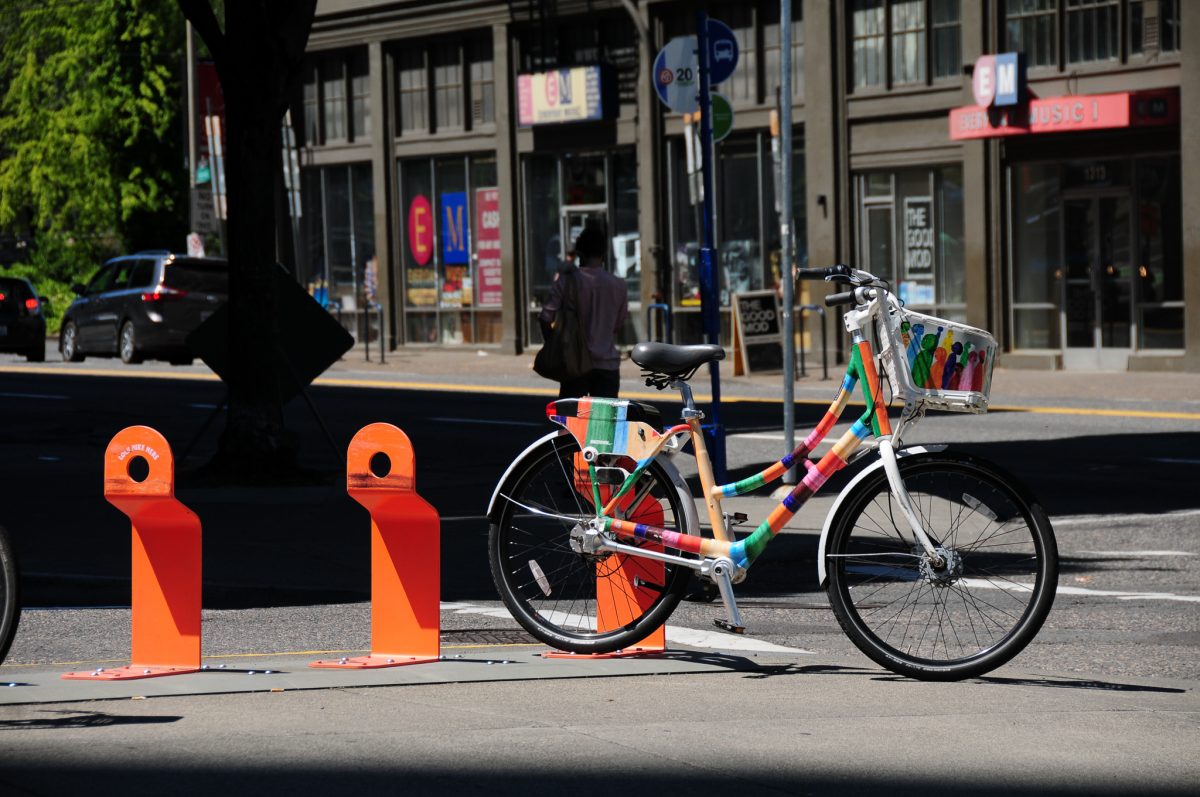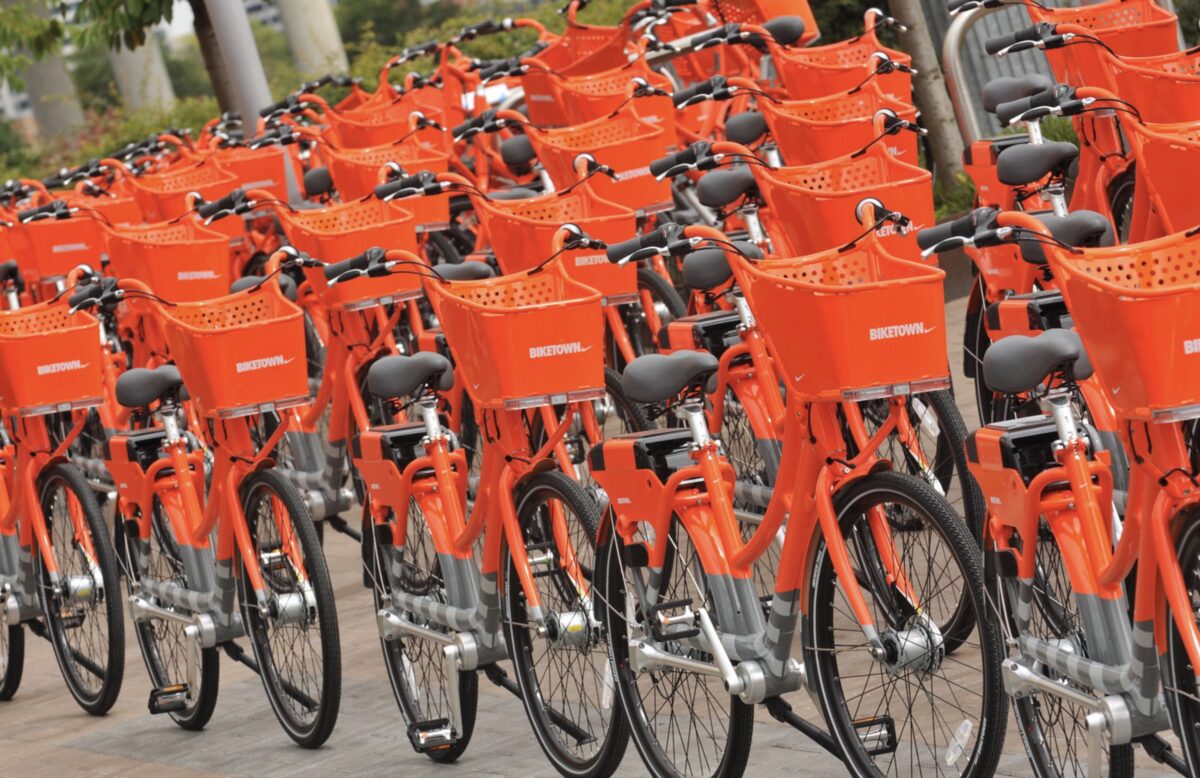
(Photos: Jonathan Maus/BikePortland)
“We’ll start gathering information to find the best use for the old, pedal-only bikes in a way that reflects our environmental and community values.”
— Dylan Rivera, PBOT
When the City of Portland launches Biketown 2.0 next month, the 1,000 bikes that were part of the original launch in 2016 will be cast aside. The Portland Bureau of Transportation says the analog, pedal-only bikes are “out of date” and “very expensive and impractical to retrofit.”
That’s about $1.6 million worth of bicycles with plenty of miles in them that could be put to use at a time when bicycling is booming and shops are having a hard time keeping bikes in stock.
For those of you wondering why they can’t be integrated into the new system, PBOT Commissioner Chloe Eudaly responded to questions about that prior to City Council’s vote on the new contract last week.
Here’s what she said:
“It would be more expensive to retrofit the current bikes than the bikes are worth. And in addition to that, there’s challenges with the docking stations so it would be extraordinarily expensive for us to offer e-bikes and non-e-bikes — and that’s not something the vendor offered anyway. We see in other cities that do have a hybrid e-bike/non-e-bike system that the e-bikes are vastly preferred by riders. And again, in our efforts to deliver a more equitable system and help people get where they need to go, and go further on these bikes, we made that decision to switch to an e-bike system.”
What PBOT and Commissioner Eudaly haven’t said yet is what they plan to do with the old bikes. It’d be a shame if these iconic Nike-orange bikes were scrapped for parts.
Given recent outcry over 1,000s of used bike share bikes being scrapped and wasted, Portland officials will be under a lot of pressure to do the right thing and put the bikes to good use.
Advertisement

Asked about the future of the old bikes, PBOT spokesman Dylan Rivera said now that the Lyft contract and expansion plan has been passed by council, “We’ll start gathering information to find the best use for the old, pedal-only bikes in a way that reflects our environmental and community values.”
Let’s assume PBOT is open to feedback and they’ll read what’s typed here (by you and I). What should they do with the old bikes? (Or should I say, what should we do with the old bikes, since (unlike this new contract) the old bikes were purchased with public dollars?)
“Whether they partnered with community orgs or distributed on their own, this seems like an opportunity to take a step towards making biking more inclusive.”
— Richa Poudyal, The Street Trust
An obvious choice would be to donate the bikes to nonprofits that specialize in warehousing and re-distributing used bikes. Organizations like WashCoBikes and the Community Cycling Center are always looking for quality used bikes they can sell/give to people and organizations in need.
And did you see what The Street Trust did recently with a fleet of used bikes they could no longer use? They donated them to affordable housing nonprofit Rose Community Development Corp who has given them to low-income residents in southeast Portland.
Newly-named Co-director of The Street Trust Richa Poudyal told us she’s like to see PBOT do something to benefit Black, indigenous and people of color, “Who have limited transportation options during this time.” “Whether they partnered with community orgs or distributed on their own, this seems like an opportunity to take a step towards making biking more inclusive.”
Kiel Johnson owns and operates Go By Bike under the Portland Aerial Tram. It’s the largest bike valet parking station in North America. He says PBOT should seed a network of municipal bike rental systems. “Give the bikes to BikeLoudPDX and let them build connections with local nonprofit housing agencies to loan them out.”
Bike Share Museum founder Kurt Kaminer says the bikes would be relatively easy to re-use. “Given their design, the bikes can be donated and repurposed really easily, he said. “I’d reach out to bicycle co-ops, charities, and community organizations for low-income neighborhoods to make it happen.” Kaminer said despite their heavy weight (45 lbs) the bikes should work very well — even after unlocked from the Biketown system. “These commuter bikes should perform exceptionally well for someone who’s interested in a reliable and comfortable A-to-B shopping bike.”
When Uber weathered intense criticism after scrapping thousands of old bike share bikes, advocates managed to save a few hundred of them for a nonprofit that plans to create “transportation libraries” throughout western New York.
Then there’s the Bike Share Museum. Whatever happens to our old fleet, I think at least one of them should end up in Kaminer’s collection to be preserved for posterity.
What’s your idea?
— Jonathan Maus: (503) 706-8804, @jonathan_maus on Twitter and jonathan@bikeportland.org
— Get our headlines delivered to your inbox.
— Support this independent community media outlet with a one-time contribution or monthly subscription.

